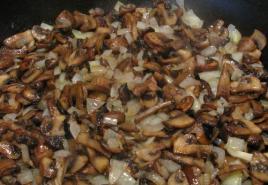Two lives to Antarova. Concordia Antarova: Two lives. Appearance and spiritual level of a person
Two lifes
Cora Antarova. (Concordia Evgenievna Antarova)
An occult novel, very popular among people interested in the ideas of Theosophy and the Teachings of Living Ethics. The heroes of the novel are great souls who completed their spiritual evolution on Earth, but remained here to help people in their spiritual ascent. According to the author - a famous opera singer, student of K.S. Stanislavsky, soloist Bolshoi Theater K.E. Antarova (1886-1959) - the book was written by her under dictation and was started during the Second World War.
The book “Two Lives” was recorded by Concordia Evgenievna Antarova through communication with the real Author through clairaudience - the way in which the books of “Living Ethics” by H.I. Roerich and N.K. Roerich, and “The Secret Doctrine” by H.P. Blavatsky were recorded. The unity of the Source of these books is quite obvious to those who read them. The teaching set forth in the books of “Living Ethics” is, as it were, illustrated by the destinies of the heroes of the book “Two Lives”. This is the same Source of the One Truth from which the Teachings of Gautama Buddha, Jesus Christ and other Great Teachers emerged.
For the first time in a book intended for a wide range of readers, bright and deep Images of the Great Teachers are given, written with great love, Their selfless work to reveal the Human Spirit is shown.
A book originally intended for a very narrow circle of students who received the guidance of the Great Teachers through K.E. Antarova
Chapter I. At my brother's
Chapter II. Ali's feast
Chapter III. Lord Benedict and a trip to Ali's dacha
Chapter IV. My transformation into a dervish
Chapter V. Me as a servant-translator
Chapter VI. We don't get to K.
Chapter VII. New friends
Chapter VIII. Another bitter disappointment and departure from Moscow
Chapter IX. We are going to Sevastopol
Chapter X. In Sevastopol
Chapter XI. On a steamship
Chapter XII. Storm at sea
Chapter XIII. Stranger from cabin 1A
Chapter XIV. Parking in B. and unexpected impressions
Chapter XV. We are sailing to Constantinople
Chapter XVI. In Constantinople
Chapter XVII. The beginning of a new life for Jeanne and the prince
Chapter XVIII. Lunch at the Stroganovs'
Chapter XIX. We are in the prince's house
Chapter XX. Ananda's arrival and music again
Chapter XXI. My illness. Henry and the Test of My Loyalty
Chapter XXII. The unexpected arrival of Sir Uomi and his first meeting with Anna
Chapter XXIII. Evening at the Stroganovs and Brazzano's exposure
Chapter XXIV. Our last days in Constantinople
Chapter XXV. Lunch on the boat. Brazzano and Ibrahim again. The captain's departure. Crooks and Olga
Chapter XXVI. Last days in Constantinople
Chapter I. The flight of Captain T. and Nal from K. to London. Wedding
Chapter II. What did the pastor pray for? Jenny remembers
Chapter III. Letters to Jenny. Her disappointment and struggle
Chapter IV. An important event in the family of Count T. On Nal’s balcony. Pastor's Will
Chapter V. Horse racing
Chapter VI. Illness and death of the pastor, his will
Chapter VII. Alice's illness, Florentine's letter to Jenny. Nikolai
Chapter VIII. Reading of the will in the parsonage
Chapter IX. Lord Benedict's second letter to Jenny. Tendl visiting Lord Benedict in the village
Chapter X. Mr. Tendl keeps his word. Henry Oberswoud. The arrival of Captain James
Chapter XI. Henry with Lord Benedict. Arrival of Captain Ratedley. Order from Lord Benedict
Chapter XII. Doria, Captain and Mr Tendle in London
Chapter XIII. Lady Cecilia Rattedley in the village with Lord Benedict
Chapter XIV. James Ratedley and Lisa at Lord Benedict's
Chapter XV. Jenny and her fiance. Jenny's wedding
Chapter XVI. Judicial office. Martin and Prince Sanger
Chapter XVII. Mother and daughter. James and Ananda. Ananda and the pastor's wife. Life plans of Nikolai and Doria
Chapter XVIII. Evening at Lord Benedict's. Wedding of Lisa and the captain
Chapter XIX. Jenny's life and her attempts to see her mother and sister
Chapter XX. The last days of Lord Benedict and his friends in London. Tendl. Confession and death of Martin. Music again. Farewell conversations
Chapter XXI. Jenny and her date with Sir Womi
Chapter I. Arrival at Ali's estate. First impressions and first day meetings
Chapter II. Second day in the Community. We are visiting a dwarf. Arab gifts. Francis
Chapter III. A simple day of Francis and my rapprochement with him. Evil dwarfs, the fight against them and their emancipation
Chapter IV. I get to know many more houses of the Community. Orange house. Who did I see in him and what was in him
Chapter V. My happiness of new knowledge and three meetings in it
Chapter VI. Francis and the dwarfs. My new attitude towards things and people. My brother Nikolai's notebook
Chapter VII. My brother's notebook
Chapter VIII. An ordinary night of the Community and what I saw in it. Second entry by brother Nikolai. My powerlessness over “being” and “becoming”. Conversation with Francis and his letters
Chapter IX. The third entry of Brother Nikolai
Chapter X. Night visit to new places of the Community with Francis. New people and my new meetings and lessons
Chapter XI. I. receives the scientist. Anninov and Beata Scalradi. Advice to me and Bronsky
Chapter XII. We are reading a book in Ali's room. An ancient tale
AN ANCIENT MAN'S TALE
Chapter XIV. My thoughts on Beata's new life. We are finishing reading an ancient book. Professor Saltzman
Chapter XV. The first experiences of a new life as a professor. His conversation with I. Scenes from his past lives. Francis and the dwarfs again
Chapter XVI. I'm reading Gerda's little book. Our departure from the Community. First day of travel through the desert. Oasis, meetings in it. A night spent by the fire. I.'s farewell to the professor. His last instructions to the scientist
Chapter XVII. Our departure from the oasis. Second day of travel, through the desert. An ominous encounter in it.
Chapter XVIII. Refectory. Events in it. My new understanding of human life paths
Chapter XIX. First breakfast in the new dining room. School. I give Francis' letter to the mother of a sick child. I.’s help in my acquaintance with the monastery of difficult obstinates. Elder Staranda and meeting with him
Chapter XX. My new acquaintances in the Community. The first failure in meeting with the inhabitants of the Dartana oasis. Radanda. Chapel of Joy. Execution of instructions. Dartana with Radanda's help
Chapter XXI. We are going to meet Yassa. The story of his life, told to us by I. Meeting with Yassa and an extraordinary vision in the desert. Return to the Community and dedication of Iasi. Refectory. Conversation with Gregor. Two speeches by I. in the refectory and on the balcony
Chapter XXII. Last morning breakfast for departing travelers. Parting words for children. Once again Ariadne. Mulga's story about Radanda. Secluded monastery of the Shrews. Staranda and Georgiy. I.'s conversation with Andreeva and Oldenkott
Several people recommended reading the book Two Lives of Concordia Antarova. However, as happens, things didn’t work out. Even after reading the first few pages, things didn't go any further. But then circumstances developed, and the book appeared before my eyes. And now, after hours and days of reading, when hundreds of pages are behind us, you realize that this book is really worth it.
Conventionally, the book Two Lives can be called a mixture of adventure and philosophy. This is the story of a young man, Levushka T., who comes to visit his older brother. He serves in the East somewhere at the beginning of the 20th century (there is electricity and trains, but there are still no cars or telephones around).
Initially, the florid language and excessive colorfulness, typical of some Russian writers, can be slightly straining. But then the action begins, events unfold quickly and rapidly, making it difficult to tear yourself away from what is happening.
This applies to adventures that take the character on trains and chases, on ships and terrible storms, in Constantinople and Indian villages. In parallel, the story of brother Lyovushka and the environment that lives and is preparing for a greater journey from London will go on. The book consists of 4 volumes, of which 1 and 3 are the story of Leo himself, while 2 and 4 are the story of his brother and those around him.
However, there is one small problem: the fourth volume consists of one chapter. That's all. And the story clearly ends. The fact is that the book, in fact, is far from just an adventure. This is philosophy and esoteric teaching, enclosed in an attractive and interesting package. And initially it was just a manuscript that was created by the author during the World War. AND long years wandered only like paper with notes for the initiates.
I don’t know why there is no story in the 4th volume - the inspiration ran out and the voice left; there is an ending, but it is inaccessible to mere mortals; something else - but it's disappointing. I really wanted to know how it would all end. Although perhaps the entire esoteric part was outlined, and there was no need to write further...
If you noticed, for now I write mainly about technical issues. This will last a little longer and only then will I express my own impression.
As I said above, the language can be richly descriptive and pretentious. But it goes away quickly in the beginning and then becomes habitual. In some places you can really feel when it was written under inspiration, and when principles and concepts were carefully incorporated into the text. And yet, due to the fact that the book was not planned for publishing and was edited relatively little, there are moments when “layers” are clearly visible: new facts that unexpectedly entered the story, or new readings, or the revelation of characters.
But all this is a certain tediousness that does not reveal the essence. What is the book about? What does it give? I was hooked at the time when my friends and colleagues threw quotes from it in droves. I won't say I had the same desire, but a couple of quotes were saved in Evernote as very deep thoughts.
As a writer, this phrase caught my attention:
There are no words that a person can throw into the world with impunity. All life is eternal movement; and this movement is created by human thoughts. A word is not a simple combination of letters. Even if a person does not know anything about the forces that he carries within himself, and does not think what volcanoes of passion and evil can be created and awakened by a carelessly thrown word, even then there are no words thrown into the world with impunity. Beware of gossip not only in words; but even in your thoughts, always try to find an excuse for people and shed peace into their souls, at least for that one minute when you are with them.
And as a person who has been watching how a departed person is mourned for more than 20 years, I appreciated this:
Our responsibilities to them do not end with the death of our loved ones. And the first of them: forget about yourself and think about them. Think about their path to perfection and liberation. To think and remember that if we cry and moan, we are putting an unbearable weight on their new, still fragile form, under which they bend and may even die. We are inclined to attribute their diligent mourning to the number of our virtues. Whereas true love, which helps them, is courage, the creative power of the heart, living in two worlds. By working on self-control, on self-discipline, we help not only the living, but also those whom we call the dead and who are actually much more alive than we are, enclosed in our dense and rough bodily coverings.
Otherwise, “Two Lives” itself is about being human. How to turn from a simple greedy and narcissistic half-animal into a true person. How love and self-control help you move to the next stages of development.
You can argue with the form and the path, but the book makes you think about your own behavior, your own train of thought and life in general. Pay attention to the people around you and the circumstances around you. And think seriously about who created these circumstances for you.
Two Lives is a long book, even despite the missing part of the plot. But it’s quite difficult to tear yourself away from it. It's interesting to read. It’s difficult to convey the impression of her—at least for now. I think there can be two main reactions to it: either rejection, stopping reading and abandoning the book and the information presented, or curiosity, which ends with the book itself.
I belong to the second group. Which one are you?
Concordia Antarova Two lifes Part 1
Series "Golden Fund of Esotericism"
In interior design illustration used:
atdigit/Shutterstock.com
Used under license from Shutterstock.com
© Milanova A., preface, comments, 2017
© Design. Eksmo Publishing House LLC, 2017
Preface
In a number of works of art devoted to spiritual, psychological and philosophical themes, K. E. Antarova’s novel “Two Lives” occupies a special place.
Let's dwell a little on the life of the author of this work, Concordia Evgenievna Antarova (1886–1959). Concordia Evgenievna was born on April 13 (new style 25), 1886 in Warsaw. Life has not spoiled her since childhood: when she was 11 years old, her father died. Concordia, or Cora as she was called, lived with her mother on her small pension and the money her mother earned from teaching lessons. foreign languages. At the age of 14, the girl suffered an even greater blow of fate: her mother died, and Cora was left completely alone. Then she studied in the 6th grade of the gymnasium. She had no relatives who could help her financially, but the girl did not give up her studies - she began to earn her living on her own, giving lessons, as her mother had done before, and was able to graduate from high school in 1901. Nevertheless, a very young girl, left alone in the whole world, had the idea of entering a monastery, and Cora became a novice. In a surviving photograph from those years, we see a beautiful, amazingly spiritual young face in monastic vestments.
Apparently, the brightest event in her novice life was singing in the church choir: it was then that it became clear that fate had gifted her with an amazingly beautiful contralto of an original, unusual timbre. This gift, together with her love for music and theater, subsequently determined the path of her life. But Concordia did not immediately understand her true calling: having arrived in St. Petersburg after graduating from high school, she first entered the history and philology department of the Bestuzhev Higher Courses for Women and only then the St. Petersburg Conservatory. She completed her studies in 1904. She had the opportunity to get a job teaching the same educational institution, but it was then that the girl realized that her true calling was in art, in music. She decided to specialize in vocals and began taking singing lessons from conservatory professor I.P. Pryanishnikov. To be able to pay for these lessons, she had to work hard. Hard work undermined her strength, she was often sick, but she persistently pursued her goal, without retreating from her plans. It was during those difficult, half-starved years that she began to develop a serious illness, which later put an end to her artistic career - bronchial asthma. In 1907, Antarova auditioned at the Mariinsky Theater. Despite the huge competition, she is hired into the troupe of the famous theater. But Antarova did not work at the Mariinsky Theater more than a year- one of the singers of the Bolshoi Theater moved to St. Petersburg for family reasons, and Antarova agreed to replace her in Moscow, becoming an artist of the Bolshoi Theater in 1908.
Her dream came true - she became an opera singer. She devoted more than 20 years of her life to the stage. Antarova's repertoire was enormous, her unique, unforgettable voice sounded in all the operas that were staged at the Bolshoi Theater during this time. Later (presumably in 1933, after leaving the stage) she was awarded the title of Honored Artist of the RSFSR.
Since 1930, changes have been taking place in Antarova’s life: it is known that from that time Concordia Evgenievna ceased her artistic activity on the stage of the Bolshoi Theater. It is difficult to say whether this was due to a progressive illness or other circumstances; exist different versions, explaining this fact. It is possible that after leaving the Bolshoi Theater K.E. She continued her concert activities for some time, but was soon forced to finally leave the stage.
Meanwhile, the time was approaching one of the most dramatic periods in the history of Russia, the period of the Stalinist dictatorship; The tragedy of millions of people, innocently executed and exiled, did not bypass the house of Concordia Antarova. Her beloved husband was shot in the Gulag, and only God knows at what cost she survived this drama. Having completed her artistic career, the singer took up literary creativity. During her work at the Bolshoi Theater, she, along with other young artists, studied acting under the direction of K. S. Stanislavsky. For this purpose, a special Opera Studio of the Bolshoi Theater was created, the purpose of which was to develop the creative acting skills of singers. Meeting Stanislavsky brought a lot of positive things into Antarova’s life; the singer carefully took notes of the famous director’s conversations. After leaving the Bolshoi Theater, Antarova wrote the book “Conversations of K. S. Stanislavsky” based on these recordings. This work went through several reprints and was translated into foreign languages.
But, of course, the main literary work of Concordia Antarova’s entire life was the novel “Two Lives.” The novel was created by her during the difficult years of the war (she then lived in Moscow). Antarova's followers claim, citing the memoirs of her contemporaries, that the birth of this work is shrouded in mystery; The multi-volume work was created in an exceptionally short time. They see the reason for such a quick creation of this novel in the fact that it was not so much written as recorded by Concordia Evgenievna. From these statements it can be assumed that the novel was created by Antarova in the same way as H. P. Blavatsky wrote her works in her time, partly finding materials for them herself, but to a greater extent hearing the voices of her spiritual Teachers, inaudible to others, dictating the text to her, or seeing in the astral light, with the help of clairvoyance, already ready text, which she had to transfer to paper. Be that as it may, K. E. Antarova undoubtedly had a spiritual connection with the White Brotherhood, thanks to which she wrote “Two Lives”. One of K. E. Antarova’s spiritual students, Indologist S. I. Tyulyaev, testified that, although Antarova was not a member of the Russian Theosophical Society, she communicated with some of its participants, that is, she was clearly familiar with theosophical teachings.

K. E. Antarova’s closest friend was the outstanding mathematician Olga Nikolaevna Tsuberbiller. Like Concordia Evgenievna, she was also a follower of theosophical teachings and the Teachers of the East.
Concordia Evgenievna died in 1959. Copies of the manuscript of the novel “Two Lives” were kept by a small number of her friends and followers, including S. I. Tyulyaev and E. F. Ter-Arutyunova. The novel was not intended for publication; in those years it was impossible to even think about it. But people interested in the philosophical and esoteric heritage of the East, as well as everything else that was prohibited by Soviet censorship, have always been in Russia, which is why samizdat existed in the USSR for many decades. Thanks to him, works prohibited for publication, including the works of H. P. Blavatsky, books of Agni Yoga and other literature located in special storage, were secretly reprinted, photocopied and passed from hand to hand. Thus, the esoteric novel by K. E. Antarova, from its very birth, invariably found readers and fans and was always in demand thinking people. It was first published in 1993 and since then has become the favorite book of everyone who strives for self-improvement and comprehension of the secret wisdom of the East.
Why did readers love him so much?
Concordia Antarova: about the path of joy from the book “Two Lives”
Cora (Concordia) Evgenievna Antarova was born on April 13, 1886, at that happy time for creative people, when the Silver Age of Russian culture was underway. And nature generously endowed her with talents - including a beautiful voice, a contralto of rare charm. Therefore, simultaneously with classes at the historical and philological faculty of the Higher Women's Courses (the famous Bestuzhev Courses), she graduates from the St. Petersburg Conservatory, takes singing lessons from I. P. Pryanishnikov, the organizer and director of the first opera society in Russia; in 1908 she was accepted into the Bolshoi Theater troupe. K. E. Antarova worked on this world-famous stage for almost thirty years.
We can only guess how important a role in her life the meeting with K. S. Stanislavsky played: for several years he taught acting in the music studio of the Bolshoi Theater, not for a moment forgetting about his main goal - to expand the consciousness of students, awakening them spirituality. Direct evidence of this is the book “Conversations of K. S. Stanislavsky at the Bolshoi Theater Studio in 1918–1922.” Recorded by Honored Artist of the RSFSR K. E. Antarova.” Of course, when the young student of the brilliant director painstakingly and reverently kept a shorthand record of her classes from time to time, and then prepared a book on their basis, which was first published in 1939 and went through several editions, K. E. Antarova did not yet have any artistic titles . But she possessed true culture of spirit, she had a pure and inspired heart, thanks to which only she could become a student in the true sense of the word.
Main characters novel “Two Lives” - great souls who completed their spiritual evolution on Earth, but remained here to help people in their spiritual ascent - came to K. E. Antarova when the Second World War was raging World War, and this contact continued for many years.
K. E. Antarova died in 1959, then the manuscript was kept by Elena Fedorovna Ter-Arutyunova (Moscow), who considered her her spiritual mentor. The keeper of the manuscript never lost hope of seeing the novel published, and until then she introduced it to everyone she found possible. And therefore we can say that this novel has been read by more than one generation of readers.
Quotes from the book “Two Lives”
Stop seeing virtue in bemoaning the failures of your personal life. Wipe your eyes, open your ears - and you will be able to hear the quiet voice of Joy telling you: “You carry God within you. He is alive in you. Seek to understand that you are never alone, that everything is in you. But everything reveals its face only to the joyful.”
Don't stop along the way to mourn the missteps of the past. Each such stop puts a corroding plaster on your present. Only those who grow in spirit, realizing their yesterday's misery, learn from their mistakes. The one who has grown stronger today because he saw his own mistake in his yesterday’s misunderstanding or quarrel with people and decided not to repeat it again, today he has grown an inch in all his affairs and meetings.
Eyes that cry cannot see clearly. Likewise, the ears of those who complain, lament and hear only the despondency of their own hearts cannot hear the call of Life. And the heart, beating in a minor scale, beats monotonously: “I, I, I.” Such a heart knows only the fear of the future and the tearing melancholy of the past. But it is unable to see or hear the current minute, the flying “now,” since behind the groans and fears about the non-existent past and no less ephemeral future, it is dead for the moments flying now, that is, precisely for true Life.
If you build your tomorrow on the tears, doubts and sorrow of today, you will never build it whole and firmly. Only by living the day with all the fullness of feelings and thoughts can you get into the atmosphere of a full-fledged existence tomorrow.
Your every smile will speed up your victory and unleash your strength. Every tear and word of despondency will ruin what you have already achieved in your abilities and push your victory far away from you.
Only the joyful one sees clearly and can act to the full extent of things.
In no dark or tragic moments of life should we forget the most important thing: the joy that you are still alive, that you can help someone, through yourself bringing a person an atmosphere of peace and protection.
A person must live in such a way that emanations of peace and relaxation are transmitted from him to everyone who meets him. It is not at all the task of an ordinary person to become or try to become a saint. But the task - the indispensable, obligatory task of everyone - is to live your simple, everyday life today in such a way as to bring a drop of peace and joy into your own and others’ existence.
Rejoice, choose pure thoughts, do not separate from the universe, and you will not know illness. They all started with fear and selfishness. Keep your heart free from garbage, and your body will remain strong and fresh.
Keep and retain bright and invigorating thoughts and drive away dull thoughts. There are no illnesses, no evil fate of a person, there is only one fate that he created for himself, fate is a consequence, fate is the result of his own thoughts and deeds.
Only you can untie the ropes of tears with which you have entangled yourself, burn the cover of despondency in which you have planted yourself, but not those “saints” to whom you call. To receive an answer from those you call, you need to create clear paths in yourself and around you along which their answers could pass to you. And first of all, we need to get out of the covers of tears and despondency.
Life is joy. The whole power of the day is that you can enjoy beauty without oppression in your heart, that you freely and calmly admire the beauty of the world and people. Then the song is sung joyfully, because the heart is light and free. Then you value family and love when lies don’t weigh you down. Every action you take is truthful and free, and with your joy you can brighten the life of every person if you are not oppressed by hypocrisy.
Remember that joy is an invincible force, while despondency and denial will destroy everything, no matter what you undertake. Knowledge does not grow from your victories over others, victories that elevate you. But from the wisdom, calmness and joy that you gained in yourself when no one saw it. Win with love and you will win everything. Seek joyfully and everything will answer you.
1. (Part 1, volume 1)
An occult novel, very popular among people interested in the ideas of Theosophy and the Teachings of Living Ethics. The heroes of the novel are great souls who completed their spiritual evolution on Earth, but remained here to help people in their spiritual ascent. According to the author - a famous opera singer, student of K. S. Stanislavsky, soloist of the Bolshoi Theater K. E. Antarova (1886-1959) - the book was written by her under dictation and was begun during the Second World War.
The book “Two Lives” was recorded by Concordia Evgenievna Antarova through communication with the real Author through clairaudience - the way in which the books of “Living Ethics” by H.I. Roerich and N.K. Roerich, “The Secret Doctrine” by H.P. Blavatsky were recorded. The unity of the Source of these books is quite obvious to those who read them. The teaching set forth in the books of “Living Ethics” is, as it were, illustrated by the destinies of the heroes of the book “Two Lives”. This is the same Source of the One Truth from which the Teachings of Gautama Buddha, Jesus Christ and other Great Teachers emerged.
For the first time in a book intended for a wide range of readers, bright and deep Images of the Great Teachers are given, written with great love, Their selfless work to reveal the Human Spirit is shown.
A book originally intended for a very narrow circle of students who received the guidance of the Great Teachers through K.E. Antarova
ABOUT THE AUTHOR Before you, reader, is an occult novel that is being published for the first time almost 35 years after the death of the author. It belongs to the pen of K.E. Antarova, one of those selfless Russian women whose life was a service to beauty and knowledge.
Cora (Concordia) Evgenievna Antarova was born on April 13, 1886, at that happy time for creative people, when the Silver Age of Russian culture was underway. And nature generously endowed her with talents - including a beautiful voice, a contralto of rare charm. Therefore, simultaneously with classes at the historical and philological faculty of the Higher Women's Courses (the famous Bestuzhev Courses), she graduates from the St. Petersburg Conservatory, takes singing lessons from I. P. Pryanishnikov, the organizer and director of the first opera society in Russia; in 1908 he was accepted into the Bolshoi Theater troupe. On this world-famous stage K.E. Antarova worked for almost thirty years.
We can only guess how important a role the meeting with K. S. Stanislavsky played in his life: for several years he taught acting in the music studio of the Bolshoi Theater, not for a moment forgetting about his main goal - to expand the consciousness of his students , awakening spirituality in them. Direct evidence of this is the book “Conversations of K. S. Stanislavsky at the Bolshoi Theater Studio in 1918-1922.” Recorded by Honored Artist of the RSFSR K.E. Antarova.” Of course, when the young student of the brilliant director painstakingly and reverently kept a shorthand record of her classes from time to time, and then prepared a book on their basis, which first saw the light in 1939 and went through several editions, K.E. Antarova did not yet have no artistic titles. But she possessed true culture of spirit, she had a pure and inspired heart, thanks to which only she could become a student in the true sense of the word.
The main characters of the novel “Two Lives” - great souls who completed their spiritual evolution on Earth, but remained here to help people in their spiritual ascent - came to K.E. Antarova when the Second World War was raging, and this contact continued many years.
K.E. Antarova died in 1959, then the manuscript was kept by Elena Fedorovna Ter-Arutyunova (Moscow), who considered her to be her spiritual mentor. The keeper of the manuscript never lost hope of seeing the novel published, and until then she introduced it to everyone she found possible. And therefore we can say that this novel has been read by more than one generation of readers.
We sincerely thank E.F. Ter-Arutyunova, who provided the manuscript of the novel at the disposal of the Latvian Roerich Society, for her kind words of encouragement to the book, which is beginning its new life.
CHAPTER I AT MY BROTHER'S The events that I am now recalling belong to long-ago days, to my distant youth.
For more than two decades now they have been calling me “grandfather,” but I don’t feel old at all; my external appearance, which forces me to give way to my place, to pick up the thing I dropped, is so out of harmony with my inner cheerfulness that I am embarrassed every time people show such respect to my gray beard.
I was about twenty years old when I came to a large Central Asian trading city to visit my brother, captain of the M regiment. The heat, the clear blue sky, something I had never seen before; the wide streets with shady alleys of tall, spreading trees in the middle struck me with their silence. Occasionally a merchant will ride on a donkey to the market. A group of women will pass, wrapped in black nets and white or dark veils, hiding the shape of their bodies like a cloak.
The street where the brother lived was not one of the main ones; It was far from the market, and the silence there was almost absolute. My brother rented a small house with a garden; He lived there alone with his orderly and used only two rooms, while the other three were entirely at his disposal.
The windows of one of my brother's rooms faced the street; The two windows of the room that I had chosen for myself as a bedroom and which bore the loud name of the “hall” looked towards the same place.
My brother was a very educated man. The walls of the rooms were lined from top to bottom with shelves and cabinets with books. The library was beautifully selected, arranged in perfect order and, judging by the catalog compiled by my brother, promised many joys in my new, solitary life.
The first days my brother took me around the city, the bazaar, and mosques; at times I wandered alone in the huge shopping galleries with painted pillars and small oriental restaurants-kitchens at crossroads; in the bustling, talkative crowd, sharply dressed in multi-colored robes, I seemed to be in Baghdad and kept imagining that somewhere very close Aladdin was passing by with his magic lamp or the unrecognizable Harun al-Rashid was wandering around. And the eastern people, with their majestic calm, or, conversely, increased exaltation, seemed mysterious and alluring to me.
One day, wandering absentmindedly from shop to shop, I shuddered as if struck electric current, and involuntarily looked back. The completely black eyes of a very tall, middle-aged man with a thick, short black beard looked intently at me. And next to him stood a young man of extraordinary beauty, and his blue, almost violet eyes also looked at me intently.
The tall brunette and the young man were both wearing white turbans and sharp silk robes. Their posture and manners were sharply different from everything around them; many of the passers-by bowed obsequiously to them.
Both of them had long since moved towards the exit, but I still stood as if spellbound, unable to overcome the impression of these wonderful eyes.
Having come to my senses, I rushed after them, but ran up to the exit from the gallery at the very moment when the strangers who had so amazed me were already in the car and driving away from the market. The young man was sitting on my side. Looking back, he smiled slightly and said something to the elder. But the thick dust kicked up by three donkeys covered everything, I could no longer see anything, and I was no longer able to stand under the sheer rays of the scorching sun.
"Who could it be?" – I thought, returning to where I met them. I walked past the shop several times and finally decided to ask the owner:
– Please tell me, who are these people who were just with you?
- People? “People came to my shop a lot today,” he said, smiling slyly.
- Only yours, right, it’s not people who want to know, but one tall black person?
“Yes, yes,” I hastened to agree. – I saw a tall dark-haired man and a handsome young man with him: Who are they? - They are our big, rich landowners. Vineyards, - oh, - vineyard! The biggest trade is with England.
- But what is his name? – I continued. “Oh-oh,” the owner laughed. – You’re burning up, do you want to meet? He is Mohammed Ali. And the young one is Mahmud Ali. - So, are both Mohammeds?
- No, no, Mohammed is only an uncle, and his nephew is Mahmud. - Do they live here? - I continued to ask, looking at the silks on the shelves and wondering what to buy, just to gain time and find out something more about the strangers who amazed me.
- What are you watching? Do you want a robe? – Noticing my soaring gaze, the owner asked.
“Yes, yes,” I was glad for the excuse. - Show me your robe, please. I want to give a gift to my brother. - Who is your brother? What does it taste like?
I had no idea what kind of dressing gowns my brother might like, since I had not yet seen him in anything other than a tunic or pajamas.
“My brother is Captain T.,” I said. - Captain T.? – the merchant cried with oriental passion. - I know him well. He already has seven robes. What else does he need?
I was embarrassed, but, hiding my confusion, I bravely said: “He gave them all away.”
- That's how it is! Probably sent it to friends in St. Petersburg. Ha-a-roshy bought robes! Look, Mohammed Ali ordered to send it for his niece. Oops, robe!
And the merchant took out from under the counter a wonderful pink robe with grayish-lilac matte stains. “This one won’t suit me,” I said. The merchant laughed merrily.
- Of course, it won’t do; This is a woman's robe. I'll give it to you - blue.
And with these words, he unrolled a magnificent purple robe on the counter. The robe was somewhat colorful; but his tone, warm and soft, might have pleased his brother.
- Don't be afraid, take it. I know everyone, your brother is a friend of Ali Mohammed. We can't sell it bad to a friend. Your brother is a great man! Ali Mohammed himself reveres him.
- Who is he, this Ali?
“I told you, she’s a big, important merchant.” Persia trades, and so does Russia,” the owner answered.
- It doesn't look like he was a merchant. “He’s probably a scientist,” I objected.
- Oh, I'm a scientist! He is such a scholar that even your brother knows all the books. Your brother is also a great scientist. – Do you know where Ali lives? The merchant unceremoniously hit me on the shoulder and said: “You see, you don’t live here much.” Ali's house is opposite your brother's house.
- Opposite my brother's house big garden, surrounded by a high brick wall. It’s always dead quiet there, and even the gates never open,” I said.
- Silence is silence. But today there will be no silence. Sister Ali Mahmoud will arrive. There will be an agreement, they will get married. If you said, Ali Mahmud is handsome, oh-me! Sister is a star from the sky! The braids are down to the floor, and the eyes are wow. The merchant spread his arms and even choked. - How could you see her? After all, according to your law, veils cannot be removed in front of men?
- The street is not allowed. You can't even go into our house. And Ali Mohammed has all the women at home open. Mulla said it many times, but he stopped. Ali said: “I’ll leave.” Well, the mullah is silent for now.
I said goodbye to the merchant, took the purchase and went home. I walked for a long time; somewhere I turned in the wrong direction and with great difficulty finally found my street.
Thoughts about the rich merchant and his nephew were confused with thoughts about the heavenly beauty of the girl, and I couldn’t decide what kind of eyes she had: black, like my uncle’s, or purple, like my brother’s?
I was walking, looking at my feet, and suddenly I heard: “Levushka, where have you been? I was about to look for you.”
The sweet voice of my brother, who replaced my mother, father, and family all my life, was full of humor, like his sparkling eyes. On his slightly tanned, smoothly shaven face, white teeth shone, as well as bright, beautifully defined lips, golden curly hair, dark eyebrows... For the first time I saw how handsome he, my brother, was. I was always proud and admired him; and now, like a little boy, for no apparent reason, he threw himself on his neck, kissed him on both cheeks and thrust a robe into his hands.
- This is your robe. And your Ali is the reason that I was completely dumbfounded and lost,” I said with a laugh. - What robe? Which Ali? – the brother asked in surprise. – Robe number 8, which I bought for you as a gift. And Ali number 1, your friend,” I answered, still continuing to laugh.
“You remind me of the stubborn little Levushka, who loved to puzzle everyone.” I see that the love of riddles is still alive in you,” the brother said, smiling with his wide smile, which unusually changed his face. - Well, let's go home, we can't stand here forever. Although there is no one, I cannot guarantee that somewhere secretly, from behind the edge of the curtain,







